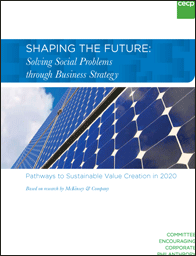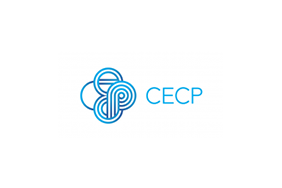CECP Report Proposes New Approach for Business to Solve Societal Challenges in the Coming Decade
Based on Research by McKinsey & Company
Published 06-17-10
Submitted by CECP

Looking forward to the next decade, CECP and McKinsey & Company have embarked on several months of research into the issues and potential scenarios businesses will confront in the next decade. The result, a groundbreaking new report, "Shaping the Future: Solving Social Problems through Business Strategy," explores the evolving relationship between business and society, forecasting that societal problems will become more complex, requiring corporate leaders to rework their business, philanthropy and community strategies. The report aims to address two key questions - first, what will the next decade look like for the world, and what are the implications for corporate involvement in solving social issues? And, second, how can corporations position themselves now to maximize their profitability as well as their societal impact?
Margaret Coady, Director of CECP, says, "This report provides today's business leaders with an urgent vision of what business could look like in the next decade. By going beyond historic levels and models of corporate community involvement, the zero-sum tension faced by corporate executives of increasing shareholder returns and doing the right thing for society can be dissolved."
This new report, which is available for free download at CorporatePhilanthropy.org and http://sso.mckinsey.com, is informed by interviews with over a dozen CECP member CEOs, including Marilyn Carlson Nelson, Carlson; John Hammergren, McKesson Corporation; Chad Holliday, DuPont; Klaus Kleinfeld, Alcoa; Duncan Niederauer, NYSE Euronext; Ken Powell, General Mills; Jim Rogers, Duke Energy; Jim Rohr, PNC; Ivan Seidenberg, Verizon; Bill Weldon, Johnson & Johnson; and Ron Williams, Aetna. Case studies explore initiatives at The Dow Chemical Company, GlaxoSmithKline, IBM, McDonalds, Nestle, Walmart, and Western Union, among others. Additionally, the report draws upon live poll results of 40 attending CEOs at CECP's Board of Boards CEO Conference in New York City on February 22, 2010.
Based on McKinsey & Company's research on global forces, the report describes five issues that will have the greatest effect on how companies engage with society, including shifting centers of economic activity away from the west, talent mismatches, global connectivity, resource constraints, and a bigger role for governments. "Shaping the Future" calls for business leaders to mitigate associated risks by looking forward to these issues and seizing opportunities for authentic engagement in society, for the benefit of both their communities and their companies. In an interview for this report, Ivan Seidenberg, chairman and CEO of Verizon, explains, "Our belief is that corporate philanthropy expands the business. If you do the right thing over time, you expand the capabilities of your customer base, business, and society."
Businesses have the ability to apply distinctive capabilities and resources to social issues that individuals, governments, and independent-sector contributors cannot. While corporate engagement in society through foundations, pro bono service, and other forms of corporate philanthropy are not new, this report advocates for companies to leverage those unique assets in closer alignment with their corporate strategy, providing greater social impact and value to the company's core business.
For more information, visit www.CorporatePhilanthropy.org.
For more information, or to schedule an interview with Margaret Coady, Director, CECP, or Lenny Mendonca, Director, McKinsey & Company, contact Courtney King, CKing@CorporatePhilanthropy.org, +1.212.825.2126.
ABOUT CECP
The Committee Encouraging Corporate Philanthropy is the only international network of corporate leaders actively working to affect positive change through corporate philanthropy. Its mission is to lead the business community in raising the level and quality of corporate philanthropy. CECP's 175 members include CEOs and chairpersons of the world’s largest and most well-regarded corporations from a diverse and broad range of industry sectors.

CECP
CECP
The Committee Encouraging Corporate Philanthropy (CECP) is the only international forum of business leaders focused on increasing the level and quality of corporate philanthropy. Membership includes more than 180 global CEOs and chairpersons of companies that collectively account for more than 40% of reported corporate giving in the United States. Membership is by invitation and is renewed annually.
CECP provides member companies with peer-to-peer executive convenings, premier networking events for corporate giving industry professionals, cutting-edge research publications, a proprietary, on-demand benchmarking system of corporate philanthropy data, and exclusive media opportunities.
Founded in 1999 by actor and philanthropist Paul Newman, together with John Whitehead, Peter Malkin, and other business leaders, CECP continues to inspire and challenge leaders in the private sector to find innovative ways to fulfill unmet social needs and to lead the way towards better alignment of business and social strategies.
Join CECP on Facebook, Twitter, Flickr and YouTube.
More from CECP

